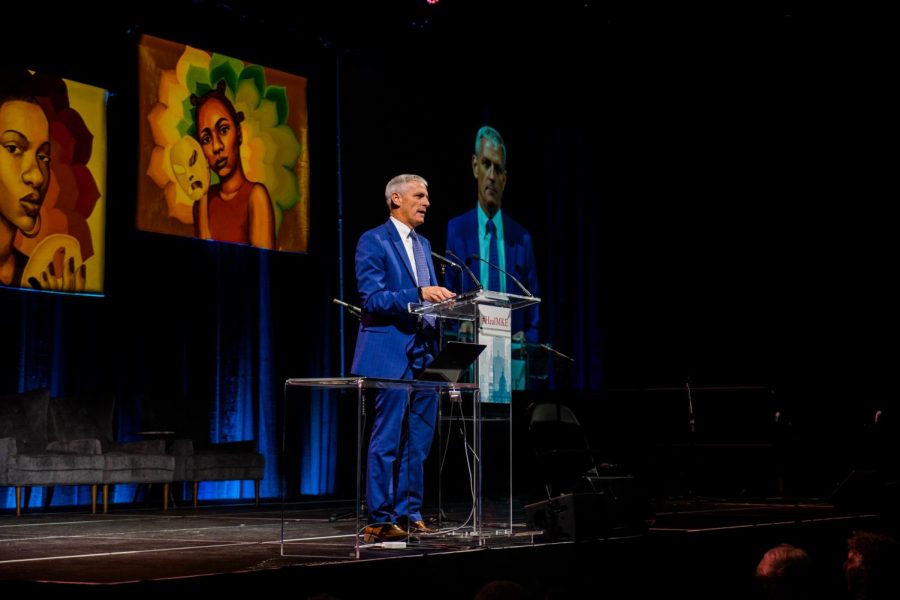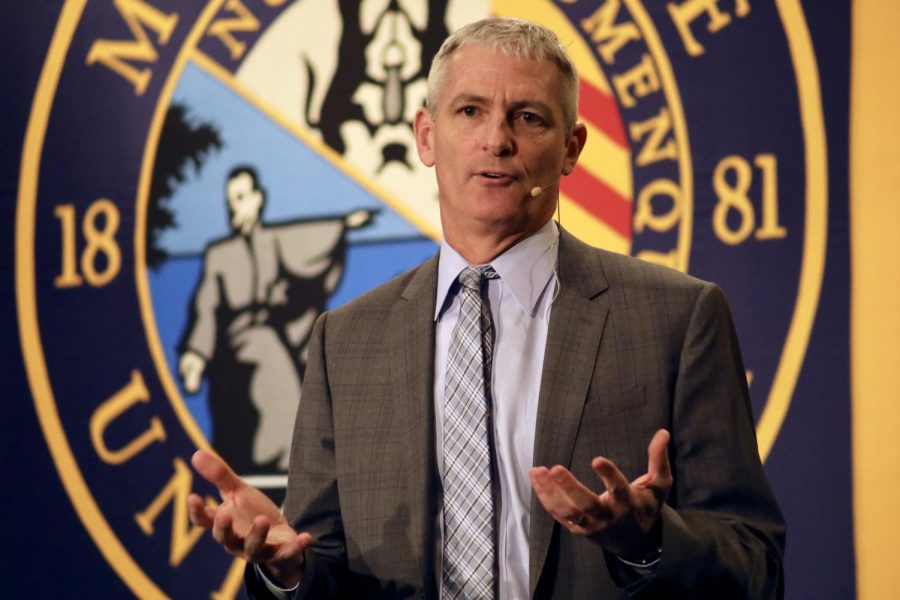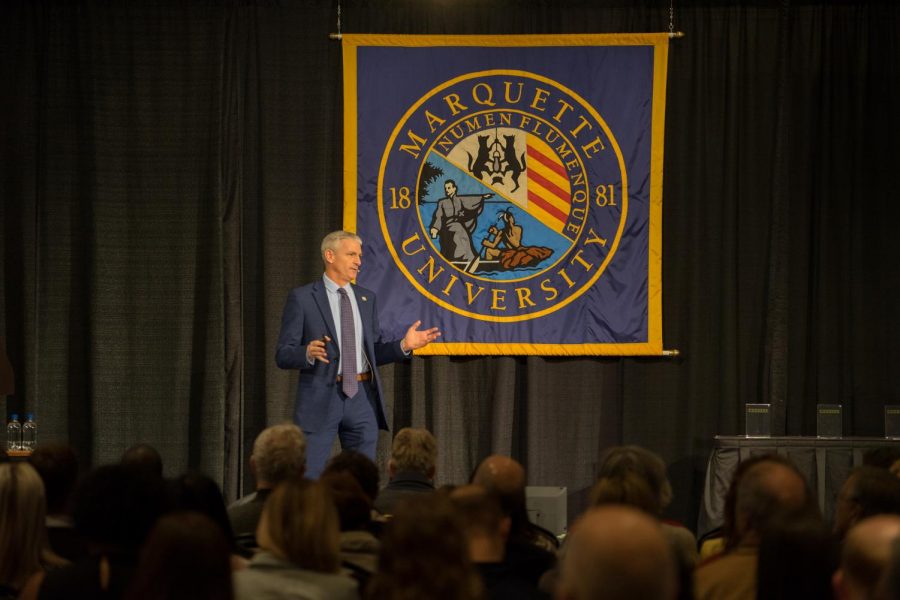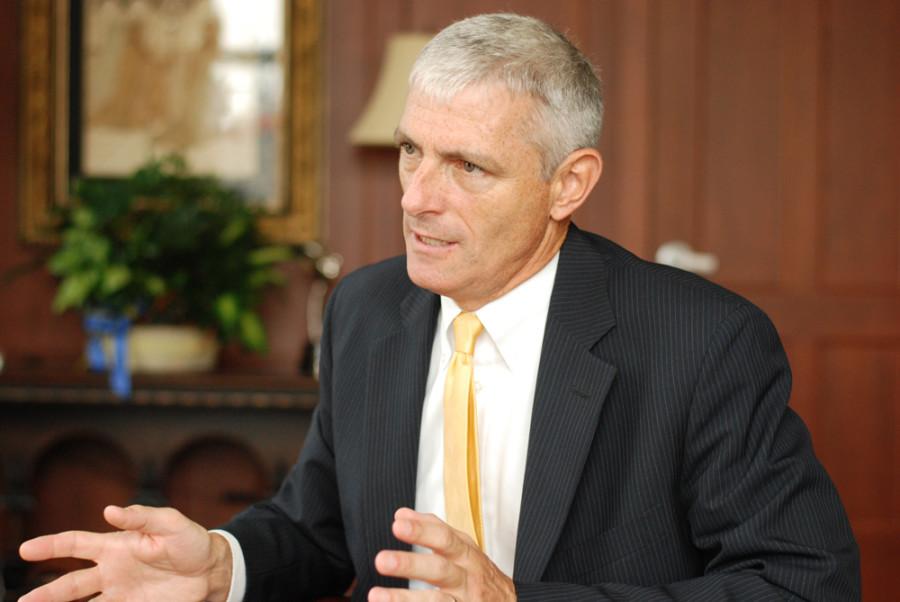Marquette University President Michael Lovell delivered the opening remarks for Scaling Wellness In Milwaukee, a three-day conference that kicked off Sept. 26 at Fiserv Forum.
The conference was held with the purpose of gathering community members to explore new ways of addressing trauma in the Marquette and Milwaukee communities.
“SWIM is a multi-disciplinary group dedicated to inspiring collaboration to help Milwaukee heal,” according to a press release about the event. “The mission of SWIM is to build collaborations throughout the region that heal trauma and create resilience.”
President Lovell and his wife, Amy Lovell, president of REDgen, helped found SWIM.
“This week’s conference is an important first step at attaining the goals of SWIM,” Lovell said. “Over the next three days, we will learn from national and local experts about recent breakthroughs and advances in trauma-informed care. Lovell said this week’s conference is only a small step in a long journey toward addressing the challenges facing Milwaukee.
Lovell said another goal of SWIM is to address disparities within Milwaukee that are results of decades of generational trauma.
“This is beyond a passion project,” Bucks President Peter Feigin said in his introductory speech. “When Mike Lovell called several months ago … he said ‘We only have one goal, Peter. We want to make Milwaukee the most trauma-informed city in the country.’”
At the event, Lovell went on to thank many of the event’s contributors. The cardinal contributor that Lovell praised was SaintA, a center for foster care, education and mental health in Milwaukee. The movement represents at least 120 organizations, Lovell said.
Lovell implored attendees to remember that this conference was not a solution — it was just a place to start building momentum.
“We all need to remember that change at the grass-root level doesn’t happen from one big initiative,” Lovell said. “It happens from a series of small but significant efforts. We all can be, and need to be, part of the solution.”
Lovell said he had an Adverse Childhood Experience score of 5 when he tested, denoting childhood trauma. An ACE test asks participants ten questions about the environment they were raised in. The amount of adverse experiences someone has is referred to as their score. Experiences can include physical, sexual and emotional abuse, physical and emotional neglect, violence between intimate partners and incarcerated family members. Participants generally fill out a resilience questionnaire at the end of the test as well.
“My ACE score is lower, but that’s because it didn’t ask the questions related (to my trauma),” said Amy Lovell, wife of Michael Lovell and president of RedGen, an organization in the Milwaukee community advocating for mental health and well being of youth. “My mom had a brain aneurysm when I was 10. We both have had experiences and had to grow up a lot younger than we wish we would have.”
Amy Lovell went on to say that her and Lovell both experienced trauma but also had a number of protective factors that allowed them to be resilient. She said they did not face the barriers that many people with trauma do face. She said people who face those barriers are often forced to relive their trauma.
Amy Lovell said the best way for Marquette students to get involved is understanding. She said students need to know how trauma affects them, and getting involved in groups that deal with trauma are great first steps.
“If you’re more involved in how to respond and how to be a compassionate listener in those relationships, that’s when healing can happen,” Amy Lovell said.
This empathy is an essential factor in addressing trauma, she said.
“Not having the attitude, ‘I’m here to fix you,’ but ‘I’m here to be with you and to listen,’” Amy Lovell said. “When somebody struggles with effects from trauma or even mental health, there’s so much shame. When you have judgment, you add to that shame.”
Michael Lovell said he has plans on getting specific majors more involved in addressing trauma around Marquette. Specifically, the College of Education would introduce curriculum for teachers to be more trauma-informed and the College of Health Sciences would be taken to areas of Milwaukee where “deserts of care” exist.
“Trauma is at the very core of many of the ills, whether it be healthcare, whether it be education, whether it be economic development – those things need to be addressed before we can really improve (them),” Michael Lovell said.




